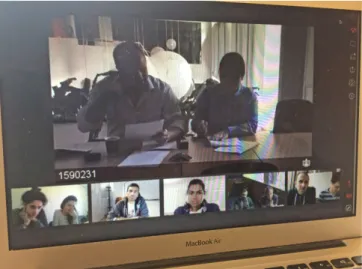LTHs 9:e Pedagogiska Inspirationskonferens, 15 december 2016
Abstract — Research schools allow research groups to efficiently use a range of group activities and approaches for entire cohorts of PhD students, potentially shifting the balance between one-on-one supervision and collective learning processes were peer influence and shared learning practices becomes increasingly important for the development of the students. This paper reports on the framing and monitoring of the early stage of such a research school.
Key words — doctoral education, research school, learning progression.
I. THE RESEARCH SCHOOL
T
his paper reports on the start-up of an EU project, a Horizon 2020 research project in Physics, wherein PhD student mobility and research school activities are integrated and monitored [1], as is now frequently required in large EU projects. The admitted PhD students were internationally recruited by their European research facilities and are scheduled to perform site visits in affiliated industry and other university groups (these are requirements in the consortium agreement). Here we solely report on the experiences of the research school activities observed during the first year of the project. The monitoring will continue longitudinally, reporting the development of the whole 3-year cycle of the project.II. RESEARCH SCHOOL ACTIVITIES
T
he collective approach of the research school is notable already during the recruitment of the PhD students and the early admission phase of the project. During this time (and on) every node in the network presents their facilities and research in videos published at the project website [1], with Virtual Lab Tours and How-to-for-beginners film clips.From the very start of the project there is a chain of monthly webinars led by senior scientists in the network who present state-of-the-art research issues hard to overview or access by other means. The webinar sessions is in turn intertwined with journal club sessions where the students do study selected research papers and relate them to the topics of the webinars and to their own research (Fig. 1). Aside
J. Mauritsson is an Associate Professor and ETP at LTH Atom Physics (e-mail: johan.mauritsson@lth.lu.se). A.. Ahlberg is an Associate Professor and ETP at LTH Centre for Engineering Education and Faculty Director of PhD studies (e-mail: anders.ahlberg@lth.lu.se).
from these semi-monthly events there has also been a winter school where the early stage researchers were assigned and trained to instruct school children using the Photonics Explorer school kit [2] and developed their communication skills, and a summer school where the student cohort interacted with senior researchers in the field (Fig. 2).
Fig. 1. The first of the web-based Journal Club seminar meetings were hosted by senior MEDEA researchers. Later (Fig. 1) these sessions were independently run by the student group, with a new doctoral candidate chairing each meeting.
Fig. 2. A half-year segment of the MEDEA research school activities. Journal clubs are undocumented events on the web, whereas the Webinars are recorded and permanently available at the MEDEA website.
Assessment of PhD school activities –
longitudinal study of a doctoral student cohort
within an EU network
LTHs 9:e Pedagogiska Inspirationskonferens, 15 december 2016
III. EARLY PROJECT STAGE OBSERVATIONS
I
n order to assess the impact and qualities of the research school activities on PhD student progression and development, recorded individual interviews and seminar observations were conducted during the start-up of the project. Such monitoring is also planned for later stages of the 3-year-project. Start-up issues that will be discussed in the presentation include• Limited transparency for the students during PhD student recruitment (including limited use of the web presentations for each involved lab), • The role of early physical meetings prior to
collective web activities,
• Web meeting group behaviour (that improved over time),
• Empowerment of students leading their own journal club sessions, and
• Individual differences in expectations of planned site visits, outreach activities, and other planned student activities.
IV. LATER PROJECT STAGE INVESTIGATIONS
Towards the end of the project, when the doctoral candidates approach their PhD defences, we will investigate student narratives on how individual supervision and collective project activities have scaffolded the candidates’ journeys towards doctorateness [3]. We also hope to be able to monitor whether or not the project activities and interventions have had an impact on the metacognition of the MEDEA PhD students, that in turn may have influenced their self-efficacy and learning progression [4].
V. ACKNOWLEDGEMENT
The MEDEA project has received funding from the European Union’s Horizon 2020 research and innovation programme under the Marie Skłodowska-Curie grant agreement No 641789.
VI. REFERENCES [1] Medea project: http://www.medea-horizon2020.eu/ [2] http://www.eyest.eu/STEM-Programs/Photonics-Explorer
[3] Trafford, V. & Leshem, S. (2008), Stepping stones to achieving your doctorate – by focusing on your viva from the start. Open University Press, 243pp.
[4] Maton, K. I., Beason, T. S., Godsay, S., Sto Domingo, M. R., Bailey, T. C., Sun, S., & Hrabowski, F. 3. (2016). Outcomes and Processes
in the Meyerhoff Scholars Program: STEM PhD Completion, Sense of Community, Perceived Program Benefit, Science Identity, and Research Self-Efficacy. CBE Life Sciences Education, 15(3), doi:10.1187/cbe.16-01-0062
